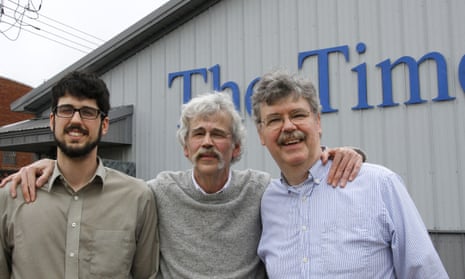Mr Rupert Murdoch is no fan of Pulitzer prizes. Not because the award-givers don’t shower honours on the Murdoch press – though they don’t – but because Pulitzer puts traditional, complex investigation first, leaving stories that sell in big numbers far behind. In short, a distraction to the business of making journalism pay.
Which is, of course, a valid enough criticism of this year’s most feted gong to the tiny local Storm Lake Times in Iowa, for taking on corporate giants such as Monsanto over the ruination of local water supplies. (Though it’s a pity the courts didn’t crown that campaign in victory.) Maybe the New York Times won plenty as usual and the Washington Post’s man on the road with Trump dug deep for glory, but this was essentially a year when smaller guys – from papers like the East Bay Times in Oakland, California, and the Gazette-Mail in Charleston, West Virginia had their moments of glory.
And there is, naturally, a theme that binds: you don’t have to be big and heavily staffed to do great work that serves your readers. Even in the teeth of doubt, sorrow and cuts, there’s a lot of inspiring work out there if you look hard enough. As I’m sure we’ll see closer to home later this week when the European Press Prize judges produce their fifth parade of winners at a grand celebration in Amsterdam.
Every shortlist tells a story, and there are huge similarities that define great stories on either side of the Atlantic. Here’s a dreadful fire killing too many young people in a Bucharest night club – and another parallel horror in Oakland. Here, ubiquitous through 2016, are the mighty Panama Papers, either centred on the Miami Herald for Pulitzer purposes or the Süddeutsche Zeitung for European ones. But the real difference comes where international boundaries, not state lines, take over.
A government – the Hungarian government – snarls then smirks benignly as the main paper of opposition goes belly up. Serbian reporters bring a challenge direct to authority – ombudsmen who seldom resolve anything, lawyers who live, retire and die watching hard cases turn to legal mush, mayors who line their own pockets, and administrations who put their own wealth creation first.
There’s an edge of pity and sorrow to some notable German reporting of year two of the migration crisis, the year we found out what had happened to the millions who streamed across Europe (including two orphans, lost, alone and working in Turkish sweatshops). But there is also introspection, an examination of how our social systems (this one Norwegian) seeks to help a teenage girl but buries her in chill bureaucracy.
Every time I write about investigative journalism these days, dismissive correspondents tell me that investigations, like journalism itself, are on some deathbed. I wish those doom-mongers would read some of the hundreds – literally hundreds – of contenders here. Not just Danish reporters exploding the frailties of EU expenses evasion, but great yarns from far and wide: how a Bosnian connection gets arms to Isis; how a state post office in Moldova became the heart of global steroid supply; how bored teenagers in a Macedonian village created fake news.
Europe and America aren’t in some kind of competition for ultimate prizes. There’s a lot of fine work and brilliant comment at every turn. But the European Press Prize, building year by year, is beginning to tell us something unexpected. European journalism, reaching out to all 47 countries on the Council of Europe list, isn’t some poor relation. On the contrary, time and again, it produces work that sits alongside any other worldwide.
On to the future? Turn to some brilliant and innovative websites such as Spain’s eldiario or De Correspondent from Holland. Follow, this year, the course of the Turkish coup in real time via a collation of the failed plotters’ intercepted WhatsApp messages. No one’s standing still, no one’s giving up. Doom doesn’t belong on this stage. It only prospers behind the curtain of different languages and national perceptions.

